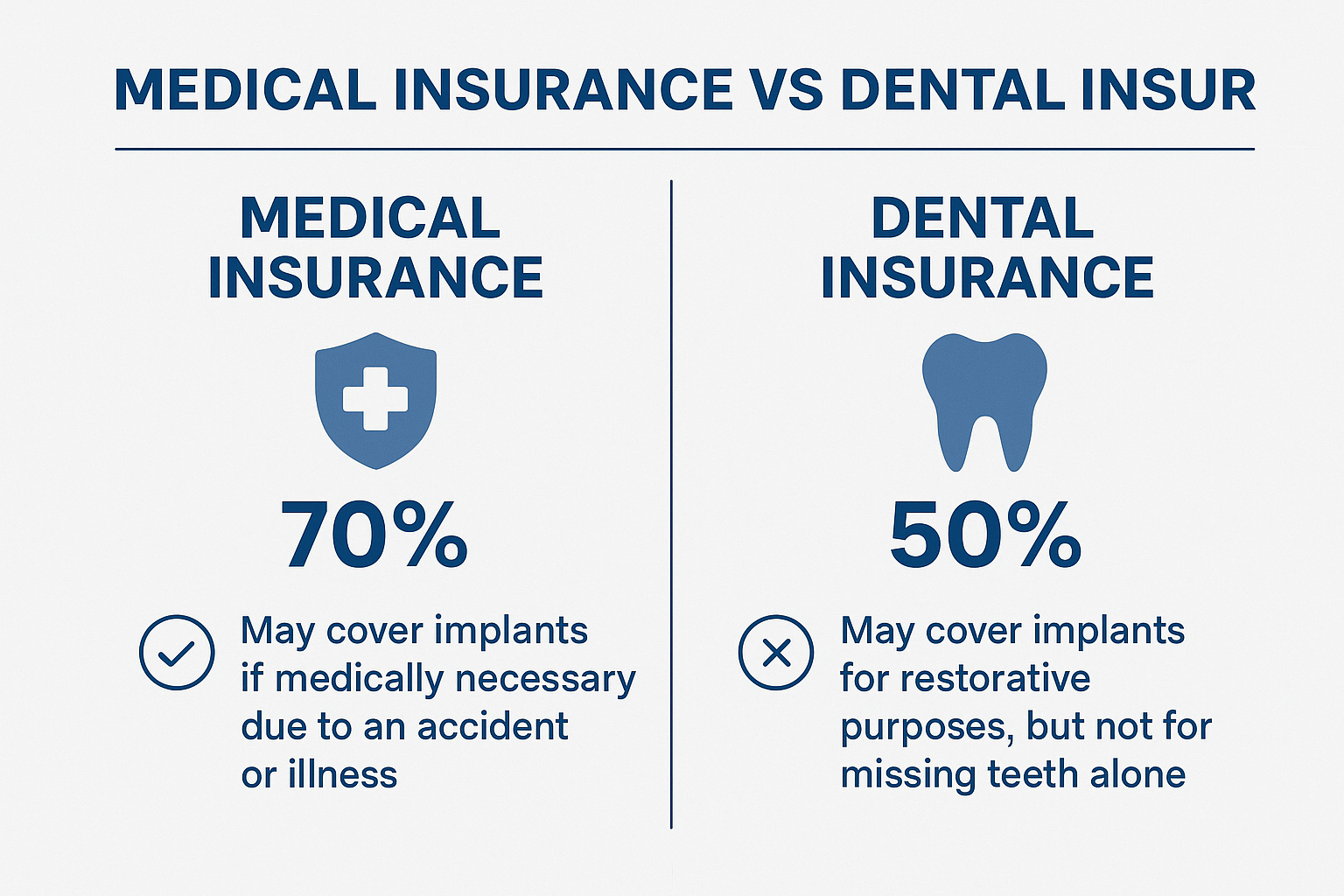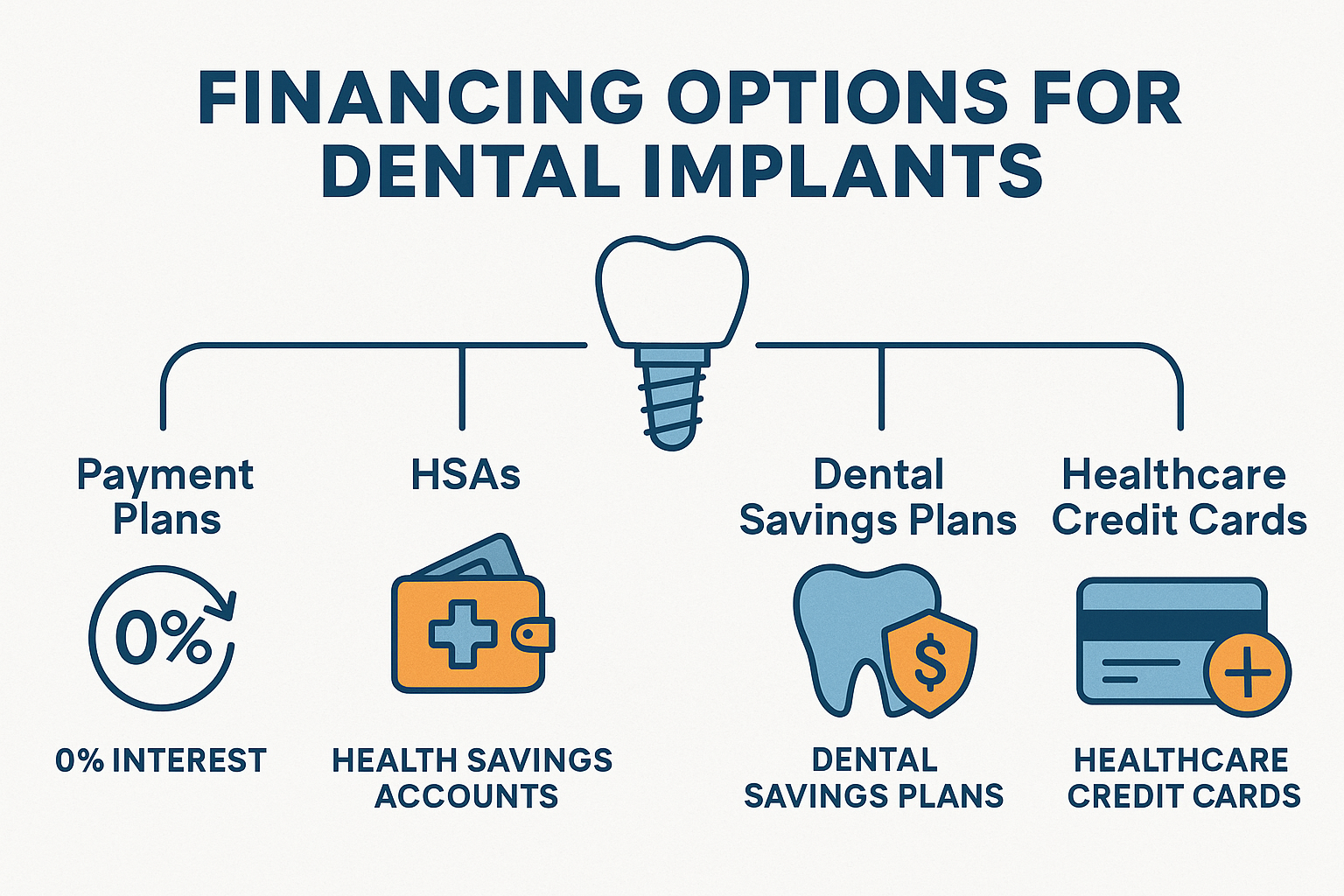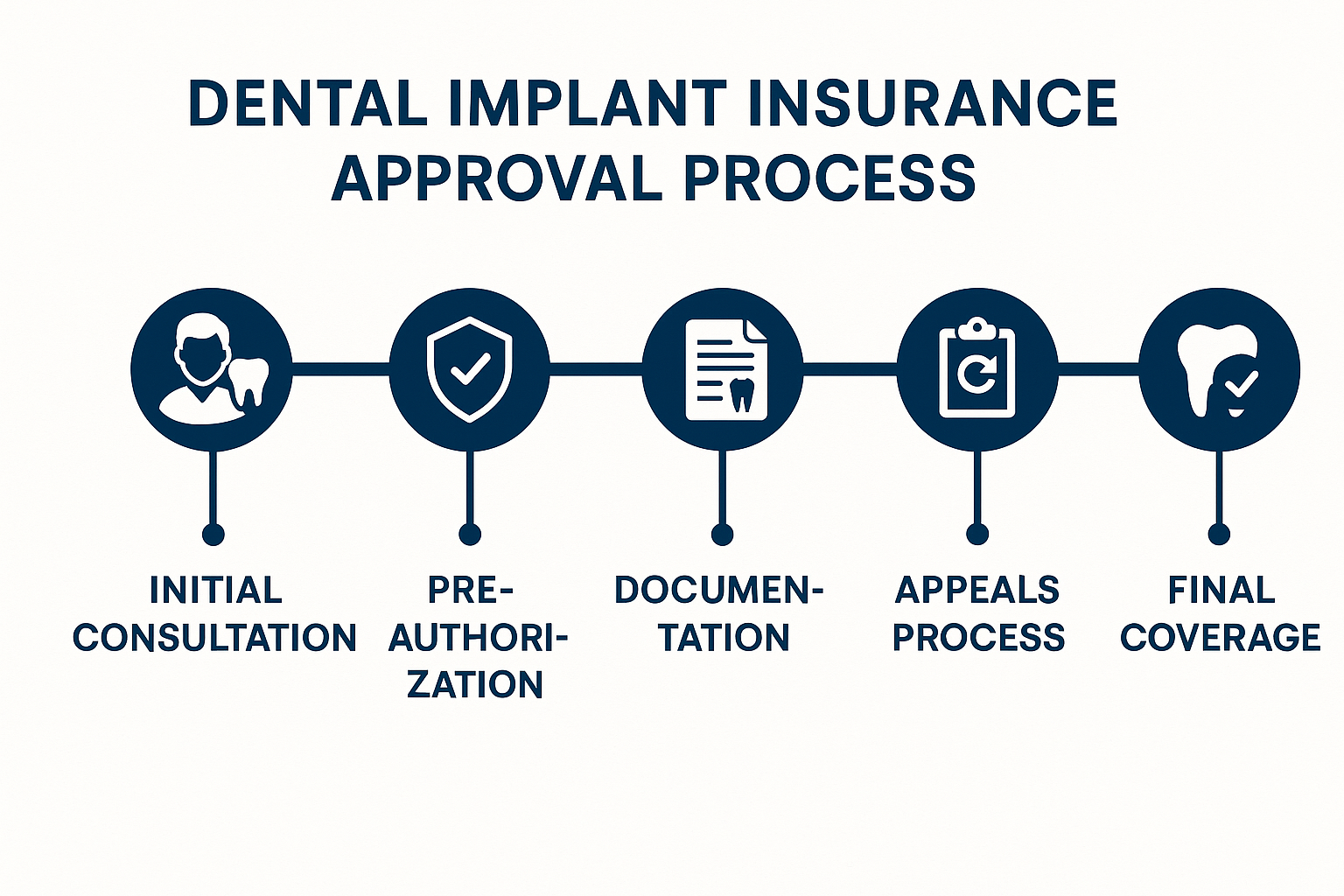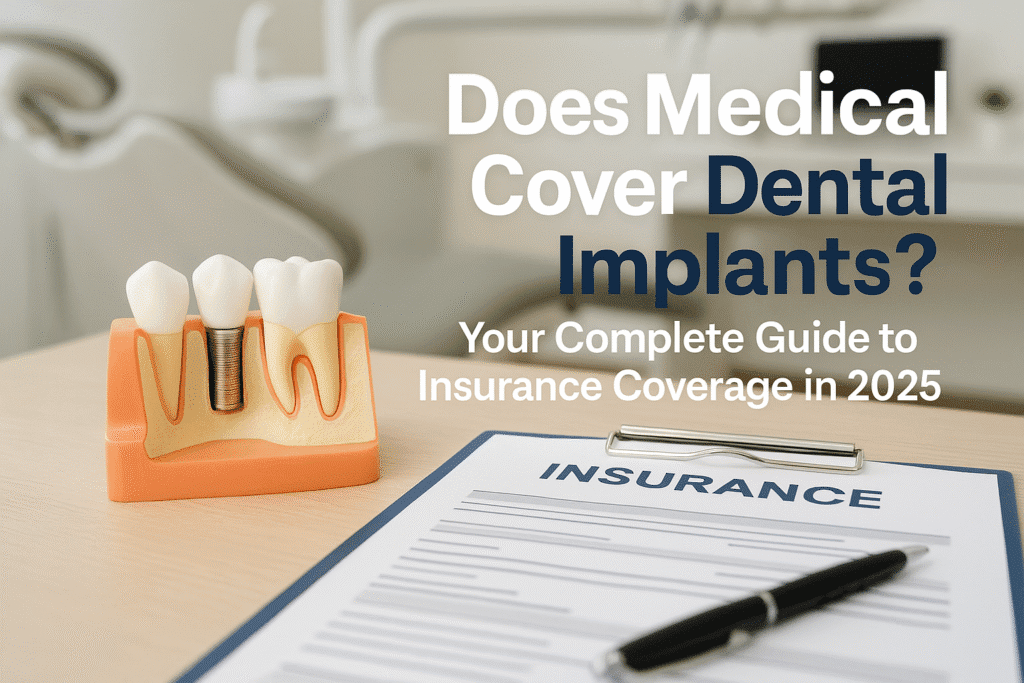Picture this: you’re finally ready to replace that missing tooth that’s been affecting your confidence for years. You’ve heard about dental implants and how they can transform your smile, but there’s one burning question keeping you up at night—does medical insurance cover dental implants? If you’re like most people navigating the complex world of healthcare coverage, you’re probably feeling overwhelmed by conflicting information and insurance jargon.
The truth is, understanding whether medical insurance covers dental implants isn’t as straightforward as we’d like it to be. While traditional medical insurance rarely covers routine dental procedures, dental implants exist in a unique gray area where medical necessity can sometimes override standard exclusions. Your journey to a restored smile deserves clarity, not confusion.
Key Takeaways
- Medical insurance typically doesn’t cover dental implants unless they’re deemed medically necessary due to trauma, cancer treatment, or congenital conditions
- Dental insurance may provide partial coverage for implants, usually covering 10-50% of the cost after meeting annual maximums
- Medicare generally excludes dental implant coverage except in rare circumstances involving hospitalization or medical complications
- Alternative financing options including payment plans, dental savings plans, and HSAs can make implants more affordable
- Understanding your specific policy details is crucial—coverage varies significantly between insurance providers and plan types
Understanding Medical Insurance vs. Dental Insurance Coverage
When we talk about whether medical insurance covers dental implants, it’s essential to understand the fundamental difference between medical and dental insurance policies. Medical insurance focuses on treating diseases, injuries, and medical conditions that affect your overall health. Dental insurance, on the other hand, typically covers preventive care, basic procedures, and sometimes major restorative work.
Here’s where it gets interesting: dental implants can sometimes cross into medical territory. If your tooth loss resulted from an accident, cancer treatment, or a congenital condition, your medical insurance might step in. However, if you need implants due to tooth decay or gum disease, you’ll likely need to rely on dental coverage or alternative payment methods.
When Medical Insurance Might Cover Dental Implants
Medical insurance providers may consider covering dental implants in these specific situations:
- Traumatic injury from accidents or sports injuries
- Cancer treatment that required tooth extraction or jaw reconstruction
- Congenital conditions like cleft palate or ectodermal dysplasia
- Medical complications that make implants medically necessary rather than cosmetic
The key factor is medical necessity—your insurance company needs to see clear evidence that the implant is required for your overall health, not just aesthetic improvement.
Does Medicare Cover Dental Implants?

If you’re wondering does Medicare cover dental implants, the answer is unfortunately quite limited. Traditional Medicare (Parts A and B) generally doesn’t cover dental implants or most dental procedures. Medicare considers dental care separate from medical care, which means routine dental work falls outside their coverage scope.
However, there are rare exceptions where Medicare might provide coverage:
- Hospital stays required for complex implant procedures due to medical conditions
- Jaw reconstruction following cancer treatment or trauma
- Medical complications during implant procedures that require hospitalization
Medicare Advantage plans (Part C) sometimes offer additional dental benefits, but coverage for implants remains limited and varies by plan. It’s worth reviewing your specific Medicare Advantage policy to understand what dental services are included.
💰 Dental Implant Coverage Calculator
Dental Insurance Coverage for Implants
Dental insurance coverage for implants varies significantly depending on your specific plan and provider. Most dental insurance plans categorize implants as major restorative procedures, which typically receive lower coverage percentages than preventive or basic care.
Here’s what you can generally expect from dental insurance:
Coverage Percentages
- Preventive care: 100% coverage
- Basic procedures: 70-80% coverage
- Major procedures (including implants): 10-50% coverage
Annual Maximums
Most dental plans have annual maximums ranging from $1,000 to $2,500. Since a single tooth implant in Dallas can cost $3,000-$6,000, you’ll likely reach your annual maximum with just one implant.
Waiting Periods
Many dental insurance plans impose waiting periods of 6-12 months for major procedures like implants. If you’re considering implants, check whether your plan has waiting periods that might delay your treatment.
Alternative Financing Options for Dental Implants

If traditional insurance doesn’t provide adequate coverage for your dental implants in Dallas, don’t let that stop you from achieving your dream smile. Several alternative financing options can make implants more affordable:
🏦 Dental Payment Plans
Many dental practices offer in-house payment plans that allow you to spread the cost over 12-24 months with little to no interest. This option provides flexibility without the need for external financing.
💳 Healthcare Credit Cards
CareCredit and similar healthcare credit cards offer promotional financing periods (often 6-24 months) with 0% interest if paid in full during the promotional period.
🏥 Health Savings Accounts (HSAs)
If you have an HSA or FSA, you can use these pre-tax dollars for dental implants, effectively reducing your cost by your tax rate percentage.
📋 Dental Savings Plans
Dental savings plans aren’t insurance but membership programs that provide discounts on dental procedures, including implants. These can offer 10-20% savings on implant treatments.
Maximizing Your Insurance Benefits
To get the most value from your insurance coverage, consider these strategic approaches:
Timing Your Treatment
- Plan around benefit years to maximize annual maximums
- Coordinate multiple implants across different benefit years
- Complete preliminary work first to establish medical necessity
Documentation and Pre-Authorization
- Request pre-authorization from your insurance company
- Gather medical documentation supporting the necessity of treatment
- Work with your dental team to submit comprehensive treatment plans
Appealing Denied Claims
If your initial claim is denied, don’t give up. Appeal processes can sometimes result in coverage, especially when medical necessity is clearly documented.
The True Value of Dental Implants

While navigating insurance coverage is important, it’s crucial to consider the long-term value that teeth implants in Dallas provide. Unlike dentures or bridges that may need replacement every 10-15 years, dental implants can last a lifetime with proper care.
Cost Comparison Over Time
When you factor in the longevity of implants compared to other tooth replacement options, the cost per year often makes implants the most economical choice. A $4,000 implant that lasts 30 years costs approximately $133 per year—less than many people spend on coffee monthly.
Health Benefits Beyond Aesthetics
Dental implants provide significant health benefits that extend beyond appearance:
- Preserve jawbone density and facial structure
- Improve chewing efficiency and nutrition
- Enhance speech clarity and confidence
- Eliminate the inconvenience of removable appliances
Special Considerations for Different Implant Types
Different types of implant procedures may have varying insurance coverage potential:
Single Tooth Implants
Front tooth dental implants due to trauma often have the best chance of medical insurance coverage, especially if the tooth loss resulted from an accident or injury.
Full Mouth Restoration
Procedures like All-on-4 dental implants or G4 dental implants may qualify for medical coverage if tooth loss resulted from cancer treatment, severe trauma, or congenital conditions.
Implant-Supported Dentures
When traditional dentures are inadequate due to severe bone loss or medical conditions, implant-supported solutions might receive partial medical coverage.
Working with Your Dallas Dental Team

Choosing the right dental practice can significantly impact your insurance experience. Look for providers who:
- Understand insurance complexities and can help navigate coverage
- Offer multiple financing options to fit your budget
- Provide detailed treatment plans for insurance submission
- Have experience with pre-authorization processes
When researching dental implants in Dallas, don’t just focus on price—consider the practice’s expertise in working with insurance companies and their commitment to helping patients find affordable solutions.
State-Specific Considerations in Texas
Texas residents should be aware of specific state regulations and programs that might affect implant coverage:
Texas Medicaid
While Texas Medicaid doesn’t typically cover dental implants for adults, emergency dental services may be covered in specific circumstances.
State Employee Benefits
Texas state employees may have access to enhanced dental benefits through their employer-sponsored plans that provide better implant coverage than typical individual policies.
Regional Insurance Variations
Insurance coverage can vary by region within Texas, so Dallas residents should verify their specific plan details rather than relying on general state information.
Questions to Ask Your Insurance Provider

Before proceeding with implant treatment, contact your insurance company with these specific questions:
- “Does my plan cover dental implants under any circumstances?”
- “What documentation is required for medical necessity?”
- “What is my annual maximum for dental benefits?”
- “Are there waiting periods for major dental procedures?”
- “Can I receive pre-authorization for implant treatment?”
Getting these answers in writing can prevent surprises and help you plan your treatment timeline effectively.
The Future of Dental Implant Coverage
Insurance coverage for dental implants is evolving as more research demonstrates their medical benefits and cost-effectiveness compared to traditional tooth replacement options. Some trends to watch include:
- Increased recognition of implants as medically necessary procedures
- Expanded coverage in employer-sponsored dental plans
- Integration of medical and dental benefits for comprehensive care
- Value-based care models that recognize long-term cost savings
Conclusion
Understanding whether medical insurance covers dental implants requires careful examination of your specific situation, insurance policies, and treatment needs. While traditional medical insurance rarely covers dental implants unless they’re medically necessary due to trauma, cancer, or congenital conditions, dental insurance may provide partial coverage with significant limitations.
The key to maximizing your benefits lies in thorough research, proper documentation, and strategic planning. Don’t let insurance limitations prevent you from exploring your options—many patients find that the long-term value and life-changing benefits of dental implants justify the investment, even with limited insurance coverage.
Your journey to a restored smile doesn’t have to be overwhelming. Start by contacting your insurance providers to understand your specific coverage, then consult with experienced dental professionals who can help you navigate both the clinical and financial aspects of implant treatment.
Remember, every smile deserves expert care, and with the right information and support, you can make confident decisions about your oral health. Whether you’re considering a single implant or full mouth restoration, understanding your insurance options is the first step toward reclaiming your confidence and enjoying life-changing results.
Take action today by reviewing your insurance benefits, exploring financing options, and scheduling a consultation with a qualified implant specialist. Your future self will thank you for taking this important step toward better oral health and renewed confidence.


Leave a Reply
Share your thoughts or ask a question about dental implants. Your email address will not be published.